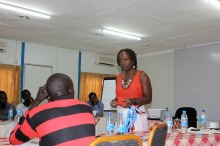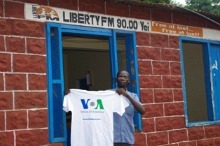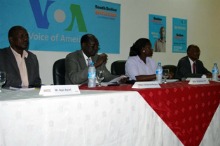Reporting On Birth Of A New Nation – “South Sudan in Focus”
“South Sudan in Focus” (SSIF) is a 30 minute weekday English language broadcast/internet program covering rapidly changing developments in the new nation of South Sudan and the region.
The program began broadcasting five days a week in the third week of September 2010. Since then the program has reported on a timeline that marked an extraordinary period in Sudanese and African history. Here are some of the highlights:
- The end of the period under the Comprehensive Peace Agreement
- The run up to the January 2011 independence referendum
- The historic vote for independence
- The run up to independence as the southern states of Sudan began to separate from the government in
Khartoum
- The May 2011 invasion of the disputed Abyei border region by Sudan’s Armed Forces
- Independence Day for South Sudan: July 9, 2011
- Building a new nation
Highlights
 The highlight of the program’s first year was July 9, 2011. On the day that South Sudan declared its independence, SSIF staff produced a one-hour special package of highlights from the ceremony at the John Garang Masoleum in Juba, the capital of South Sudan. Highlights from the program include extensive clips of President Salva Kiir Mayardit’s inaugural
The highlight of the program’s first year was July 9, 2011. On the day that South Sudan declared its independence, SSIF staff produced a one-hour special package of highlights from the ceremony at the John Garang Masoleum in Juba, the capital of South Sudan. Highlights from the program include extensive clips of President Salva Kiir Mayardit’s inaugural
address; exceprts of remarks by Sudan’s President Oman al-Basher; clips of the US Ambassador to the United Nations, Susan Rice; historic audio of the late Dr. John Garang, considered the father of South Sudan; historic audio of former US Sec. of State Colin Powell, a key figure in negotiating the CPA; and comments throughout the show from citizens of the new nation talking about their feelings about independence and their hopes and dreams for the new nation.
On that day, the program officially changed its name to “South Sudan in Focus” (from “Sudan in Focus”).
Freelance reporters based in Juba, Aweil, Bor, Yambio, Bentiu and Khartoum reported on the extraordinary events of the day, providing updates and vox pop from around the new nation.
An exclusive interview with South Sudan’s President Salva Kiir Mayardit provided another highlight to the show’s first year. President Kiir, who does not grant many media interviews, was in New York for the opening session of the UN General Assembly where he delivered his first speech as president to the UN. John Tanza traveled to New York, with Paul Ndiho of VOA TV, for the interview, which was recorded for radio, TV, and internet. The full interview can be heard on the SSIF webpage. Excerpts were also provided for broadcast to the Sudan Radio Service, a USAID funded program heard in South Sudan.
Beginning on January 9, 2011, voters in southern Sudan, Sudan and in the diaspora began one week of voting on whether the south should become an independent nation. SSIF
provided coverage of the voting in southern Sudan with reports from around the country. The show’s reporting consisted of government updates, as well as the interviews with voters in order to capture and convey the drama and spirit of this historic week.
Washington based co-host John Tanza provided a report from voting in the Washington, DC suburb of Alexandria, Viriginia, and we had reports from other voting centers including Nairobi and London.
SSIF has provided timely and extensive coverage of several conflicts in border regions between north and south over the last few months, including Sudan’s invasion of the disputed Abyei region In May 2011; its incursion into Southern Kordofan state in Sudan, including bombings of civilians and alleged human right abuses; and the overthrow of the governor of Blue Nile state, Malik Aggar, who is a member of the SPLM-North and has close ties to southern leaders. SSIF reporters traveled to these conflict areas and provided in-depth reports.
SSIF Program Staff
 The program is produced at the VOA studios in Washington, with co-hosts based in Washington and Juba.
The program is produced at the VOA studios in Washington, with co-hosts based in Washington and Juba.
Based in Washington:
John Ogulnik, Project Coordinator
David McGuffin, Managing Editor
John Tanza, Co-host/Senior Reporter
Chris Owens, Producer

Based in Juba:
Charlton Doki, Cohost/Senior Reporter
John Ogulnik heads the team, helping to provide editorial direction and long term planning. He has been a broadcaster for more than 30 years and was an original member of VOA’s “Studio 7” broadcast to Zimbabwe.
Managing Editor McGuffin works with the Juba editor in assigning and editing reporter pieces, and writes and edits the show each day. McGuffin has reported from around the world, including several years living in Nairobi just prior to joining VOA. John Tanza, one of the most experienced South Sudanese journalists conducts interviews from the VOA studios and helps provide editorial direction to daily coverage. Long time radio producer Chris Owens assembles the daily program, working magic on audio elements to make the show sound better. Listeners have Chris to thank for the show’s highly produced features, including the Friday music interviews.
Charlton Doki, a well-known South Sudanese journalist, co-hosts the show, reports on developments in Juba and helps provide direction to the freelance reporters based in South Sudan. The Juba based editor, Michael Onyiego, has just moved into the position. Prior to joining SSIF he was a freelance reporter based in Nairobi, where he regularly filed for VOA’s Central News Desk. He takes over from Alan Boswell, who left SSIF in August. Alan’s knowledge of South Sudan was a great benefit to the show and he provided solid editorial direction to the show’s freelance reporters.
Format
The 30 minute show is formatted to provide the latest coverage on significant news events taking place in South Sudan and the region. Top news of the day is followed by feature reports, world and African news headlines, a news or feature report from elsewhere in Africa; the show concludes most days by featuring the music of Sudanese artists.
Challenges
Much of the coverage is generated by freelancers based around South Sudan, in Yambio, Yei, Bentiu, Bor, Aweil and Juba. In the next few weeks we will be adding reporters in Rumbek, Malakal, and other towns. We also have a reporter based in Khartoum, reporting on developments in Sudan.
South Sudan is one of the least developed nations in the world. The area was generally neglected by the government in Khartoum, and what little infrastructure there was was destroyed during the 22 year civil war, which ended with the signing of the Comprehensive Peace Agreement in early 2005.
Under the CPA the south became an autonomous region within Sudan and the process of nation building began. Western nations and international NGO’s poured millions of dollars into southern Sudan to help begin building the infrastructure of a nation – everything from roads to schools to a vibrant civil society.


The task of SSIF stringers on the ground is to cover the difficult work of nation building. Freelance reporters provide frequent reports on the difficult issues facing the government in Juba: building the physical and technological infrastructure; promoting democratic institutions, including the media; private sector development; gender issues; and the difficulty of building education and health care systems.
Washington based staff often speak with US politicians and policy makers, academics and analysts to provide an in-depth view of developments in South Sudan. In addition, SSIF’s Washington staff, as well as VOA staff, provides updates on Congressional hearings and other new events related to South Sudan, including the recent confirmation hearing for President Obama’s nomination of Susan Page to be the first US ambassador to South Sudan.
Recently SSIF has begun posting even more of its pieces and interviews on the program webpage. A new staff member will be brought on shortly to report from Washington and to pay particular attention to the webpage.
The show is a work in progress and over the next few months we will look to produce more panel discussions with news makers and analysts. In addition, SSIF is looking to add a weekly health segment to the format, possibly in conjunction with English to Africa’s soon to be launched call-in program, “Health Chat.”
Impact
“South Sudan in Focus” reached millions of people via shortwave, FM broadcasts and the internet. InterMedia, through its Sudanese partner, Infinite Insights, conducted a survey in Juba in May 2011 with a series of focus groups of English speakers, both listeners and non-listeners. Participants praised the show’s unique content and it ability to bring a multiplicity of voices to key stories. (The full InterMedia report is submitted with this report.)
“South Sudan In Focus” and other English to Africa VOA stories are appearing in the Sudan Daily News – a compilation of media reports about Sudan, put out daily by State/USAID. “South Sudan In Focus” stories also are posted on internet at www.voanews.com/southsudan, and regularly end up in top Google searches of Sudan news. The Wall Street Journal in February 2011 quoted VOA in its reporting about the crackdown on Sudanese protesters in Khartoum (it was reporting by stringer Alsanosi Ahmed in Khartoum)

Alsanosi reports that he has received calls from dozens of people telling him they heard him on VOA. He reports that the program is getting many listeners in the north, especially among southerners and northern students, and he’s had calls from Darfur as well, from people who appear to be listening via shortwave.
On a reporting trip outside his home town in Aweil, Northern Bahr el Ghazal state, stringer Hou Akot Hou, tells us he met people who said “that we (VOA, Sudan project team) are doing great work. This means they listen on a regular basis. Our team of listeners is getting increased every day.”
Two “South Sudan In Focus” stringers have been honored for their journalism – Marvis Birungi (stringer in Juba) was a recipient of the 2010 UNICEF Sudan Media Awards, which recognize achievements by Sudanese journalists in promoting children’s issues through the media. And Alsanosi Ahmed (stringer in Khartoum) was brought to Washington in August 2010 for a young leadership initiative by the Obama administration.
Listener Comments
Most of the comments and feedback SSIF receives is through text messages. Here is a small sampling of some of the comments we have received from listeners:
- “HELLO JOHN TANZA AND CHARLTON DOKI. THANK YOU FOR THE GOOD SERVICES YOU ARE DOING TO BRING ALL THE WORLD NEWS TO THE PEOPLE. CAN YOU PLEASE PLAY THE SONG CELEBRATION BY EMMANUEL KEMBE.”
- “I AM VERY GRATEFUL TO VOA FOR UPDATING US WITH FRESH NEWS ESPECIALLY US WHO ARE FAR FROM MOST OF THE MEDIA. SORRY FOR THOSE ADUCTED BY LRA. LET OUR NEW GOVERNMENT THINK DEEPLY ABOUT SUCH ISSUES.”
- ”TO PROMOTE REAL DEMOCRACY, THE SPLM SHOULD SHARE THE NATIONAL CAKE WITH THE OTHER POLITICAL PARTIES.”
- “SUDANESE LEADERS SHOULD OPEN THEIR EYES WELL TO FIGHT CORRUPTION AND WORK HARD FOR SUCCESS.”
- “I AGREE WITH THE PEOPLE IN THE STORY FROM YOUR REPORTER PHILIP THON ALEU ABOUT THE BAD ROADS BETWEEN JUBA AND BOR. BAD ROADS ARE A POTENTIAL SOURCE OF INSECURITY, AS THEY ARE IMPASSABLE. OUR GOVERNMENT SHOULD WORK HARD TO IDENTIFY PRIORITIES.”
- “I APPEAL TO THE GOVERNMENT OF SOUTH SUDAN TO EXTEND THE DEADLINE GIVEN FOR CITIZENS TO CHANGE THEIR OLD SUDANESE POUNDS FOR NEW ONES. THIS WILL GIVE A CHANCE TO THOSE IN THE VILLAGES TO GET THE NEW CURRENCY.”
Panel Discussion and Webcast
In February, VOA’s “Sudan In Focus” team hosted a Panel Discussion and Webcast “South Sudan: Building A New Nation” in Washington, DC. It was videotaped, and webcast live at www.InsideVOA.com on the 17th of February. A DVD of this event was given to South Sudan TV, based in Juba, and they broadcast it, in its entirety, to their audience in Southern Sudan.
The US Embassy Public Affairs Officer, and the “Sudan In Focus” team, organized for this broadcast to happen.
Participants: Andrew Natsios, Distinguished Professor, Georgetown University, Former U.S. Special Envoy to Sudan; Ezekiel Lol Gatkuoth, Head of Mission to the United States and the United Nations, Government of Southern Sudan; John Tanza Mabusu, co-host of VOA’s “South Sudan in Focus” broadcast.
The event was opened by Dan Austin, Director of VOA, and moderated by Joan Mower, Director of VOA’s Business Development. Audience included U.S. and foreign media representatives, experts from think tanks, and scholars and students from the universities in Washington Metro area.
Town Halls
VOA sponsored three town hall style meetings in Juba during the past year. The “Public Discussions,” as they are called in South Sudan, provide south Sudan’s citizens the chance to interact with and question government officials, American officials, and others.
- December 13, 2010 – “The Historic Referendum: What It Means For The People of Southern Sudan”
- March 25, 2011 – “South Sudan: Building a New Nation”
- June 24, 2011 – “South Sudan Independence: The Way Forward”
Among the panelists were the pre-independence Government of South Sudan (GoSS) Minister for Labor and Public Service, Awut Deng Acuil; the GoSS spokesman Barnaba Marial Benjamin; Mission Director, USAID Sudan, William Hammink and others.
- December 13, 2010 – “The Historic Referendum: What It Means For The People of Southern Sudan”
- March 25, 2011 – “South Sudan: Building a New Nation”
- June 24, 2011 – “South Sudan Independence: The Way Forward”
Journalist Training
VOA provided media training for 16 journalists in Juba, December 7 – 11, 2010. Most of the trainees were VOA freelancers. However, in conjunction with the US consulate in Juba we included reporters for some local radio stations, as well as one staffer from the Sudan Radio Service, a USAID funded project.

The training was conducted by Rachel Jones, a Nairobi based Knight Fellow with the International Center for Journalists. Before becoming a trainer, Rachel was a reporter for the Detroit Free Press and NPR.
Affiliates and Distribution
VOA has obtained equipment and a broadcast license to provide a dedicated 24/7 FM in Juba to carry SSIF, as well as other VOA programs. A site survey has been conducted and the installation should be completed in the next few months.
SSIF is heard throughout South Sudan and neighboring countries on three strong shortwave frequencies. The difficult task of building a network of FM affiliate stations has begun and has seen some successes. Currently, FM stations in Juba, Yei, Maridi and Yambio are carrying SSIF.
It should be noted that radio stations in South Sudan have very little equipment, few resources, and a small revenue base. The stations often have problems maintaining what little equipment they do have, making the task of building a network of affiliates labor intensive and expensive.
SSIF is also heard on VOA’s dedicated FM frequency in Nairobi, as well as in neighboring countries with large South Sudanese populations. The program can be heard on demand on the web at www.voanews.com/southsudan.
